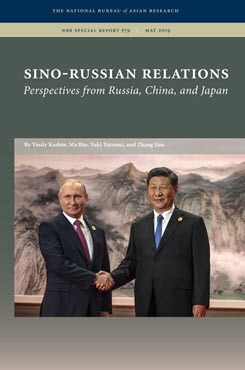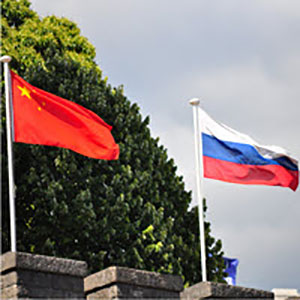Foreword: Sino-Russian Relations: Perspectives from Russia, China, and Japan
This foreword to the report “Sino-Russian Relations: Perspectives from Russia, China, and Japan” provides background on the project that produced the report and and summarizes the three essays.
Although clear obstacles to closer alignment remain, Sino-Russian relations have significantly deepened over the last decade.[1] For one, arms sales have grown significantly in terms of both quantity and quality in recent years after recovering from a sizable decline in the first decade of the 21st century.[2] China and Russia have also increased their level of military-to-military cooperation and the frequency of joint exercises during this same time period. Both countries oppose what they see as a U.S.-dominated international system and seek to challenge U.S. influence abroad with the aim of creating a more multipolar international order. As a result, they have become increasingly aligned and at odds with U.S. interests on a number of important regional issues, including on the Korean Peninsula, in the Middle East, and even in Latin America.[3]
This trend of closer alignment between China and Russia against U.S. interests is reflected in the findings of a two-year research project conducted by the National Bureau of Asian Research (NBR) on the strategic implications of deepening Sino-Russian relations. The project, which spanned 2016–18 and was supported by a generous grant from the Carnegie Corporation of New York, produced core findings and policy options based on 50 commissioned papers and formal presentations at seven workshops and events from December 2016 to November 2018.[4] The project involved deliberations by over 80 U.S. experts and 30 leading specialists from China, Russia, Japan, South Korea, Oceania, and Europe.
In many instances, clear differences emerged in the perspectives of U.S. and regional experts on the current state of Sino-Russian relations and the outlook for closer cooperation. The project has sought to address this gap by integrating regional experts into ongoing project discussions through their participation in workshops and contributions to publications. To that end, this NBR Special Report features Russian, Chinese, and Japanese assessments of Sino-Russian relations and the prevailing strategic thinking in these countries on the level of cooperation across the political, economic, and security domains.
In the first essay, Vasily Kashin highlights the continuity of current Russian policy with the policies enacted at the end of the Cold War that addressed the negative consequences of the Sino-Soviet split. Whereas Russia’s preference is to use the great-power competition between China and the United States to its own advantage as part of an independent foreign policy, in reality the geopolitical environment following the Ukraine crisis in 2014 has pushed Russia into deepening alignment with China in multiple domains. Despite lingering distrust, security ties continue to grow, and current levels of military-to-military cooperation are the closest Russia has had to date with a major power. Kashin stresses, however, that an improvement in relations between Russia and the West would likely curb further cooperation with China in the future.
In the second essay, Ma Bin and Zhang Jian identify China’s need for positive relations with its largest neighbor to advance ongoing domestic reform and opening-up policies, as well as shared interests in countering a U.S.-dominated unilateral order, as core drivers of Sino-Russian cooperation. At the same time, they emphasize the challenges confronting the relationship, which include a general structural incompatibility between their economies, a growing expectations gap, a lack of coordination between Russia’s Eurasian Economic Union and China’s Belt and Road Initiative, and finally the dynamics of triangular relations with the United States. Ma and Zhang propose a new lens for viewing the China-Russia relationship, through which relations are seen as a continuous back-and-forth movement between the extremes of alignment and opposition.
Besides the United States, China, and Russia, the country with perhaps the most at stake in the Sino-Russian relationship is Japan, with opposite ends of the island nation projecting deep into the strategic zones of Russia to the north and China to the south. In the final essay, Yuki Tatsumi examines the impact of China-Russia relations on Japan’s strategic interests. She concludes that despite the potential threats that closer cooperation may present to Japan and its allies, the Japanese establishment continues to downplay the deepening ties between China and Russia and to believe that their partnership is still based on a limited “marriage of convenience.” Uncertainty about the U.S.-Japan alliance has pushed Japan to hedge by trying to improve bilateral relations with both countries, particularly Russia. Tatsumi argues that Japan will struggle to adapt to a worsening regional security environment if it does not realize the significance of Sino-Russian cooperation, and the United States could contribute to improving that environment through greater engagement with Japan on the issue.
Brian Franchell
Senior Project Manager, Political and Security Affairs
The National Bureau of Asian Research
ENDNOTES
[1] Challenges include the lengthy history of distrust, economic asymmetry, and differing stakes in the current international order. For further discussion, see Robert Sutter, “China-Russia Relations: Strategic Implications and U.S. Policy Options,” National Bureau of Asian Research (NBR), NBR Special Report, no. 73, September 2018, 9–10.
[2] Richard Weitz, “Growing China-Russia Military Relations: Implications and Opportunities for U.S. Policy,” in Axis of Authoritarians: Implications of China-Russia Cooperation, ed. Richard J. Ellings and Robert Sutter (Seattle: NBR, 2018), chap. 3.
[3] For a discussion of Sino-Russian cooperation regarding the Korean Peninsula, see Jaewoo Choo, Youngjun Kim, Artyom Lukin, and Elizabeth Wishnick, “The China-Russia Entente and the Korean Peninsula,” NBR, NBR Special Report, no. 78, March 2019.
[4] Sutter, “China-Russia Relations,” 3.



